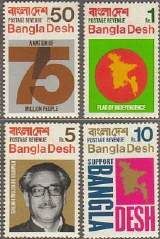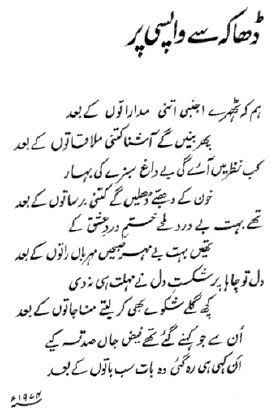Adil Najam
 As the fourth part of our series on the events of 1971, we are reposting this post which was first published at ATP on December 16, 2006. We are reposting it with all the original comments since they, as a whole, are very much part of the conversation we all need to have with ourselves. The previous three parts of the series can be read here, here and here.
As the fourth part of our series on the events of 1971, we are reposting this post which was first published at ATP on December 16, 2006. We are reposting it with all the original comments since they, as a whole, are very much part of the conversation we all need to have with ourselves. The previous three parts of the series can be read here, here and here.
Today is December 16.
Today Bangladesh will mark its 35th ‘Victory Day.’
 Most Pakistanis will go about their lives, not remembering or not wanting to remember. We should remember – and learn – from the significance of this date.
Most Pakistanis will go about their lives, not remembering or not wanting to remember. We should remember – and learn – from the significance of this date.
Not because it marks a ‘defeat’ but because it marks the end of a dream, 24 years of mistakes, horrible bloodshed, traumatic agony, and shameful atrocities. The constructed mythologies of what happened, why, and who is to be blamed need to be questioned. Tough questions have to be asked. And unpleasant answers have to be braced for. We need to honestly confront our own history, for our own sake.
But right now, the goal of this post is different. We at ATP just wish to extend a hand of friendship to our Bangladeshi friends. May the memories we make in our future be very different (and more pleasant) than the scars we carry from our past.
There is much – too much – that I wish to say; but cannot find words for. So let me do what I always do when I am at a loss of words. Let me quote Faiz Ahmad Faiz, who in his memorable 1974 poem ‘Dhaka say wapsi par’ (On Return from Dhaka) expressed what I wish to say so much better than I ever could.
We share with you here the original poem in Urdu, a version in ‘Roman Urdu,’ a wonderful English translation of the poem by the late Agha Shahid Ali in his book The Rebel’s Silhouette, and a video of Nayarra Noor singing the verses with the passion and feeling that they deserve.
ham ke Thehre ajnabi itni mulaaqaatoN ke baad
phir baneiN ge aashna kitni madaaraatoN ke baadkab nazar meiN aaye gi be daaGh sabze ki bahaar
khoon ke dhabe dhuleiN ge kitni barsaatoN ke baadthe bahut bedard lamhe khat’m-e-dard-e-ishq ke
theiN bahut bemeh’r subheiN meh’rbaaN raatoN ke baaddil to chaaha par shikast-e-dil ne moh’lat hi na di
kuchh gile shikwe bhi kar lete manaajaatoN ke baadun se jo kehne gaye the “Faiz” jaaN sadqe kiye
an kahi hi reh gayi woh baat sab baatoN ke baad
Agha Shahid Ali’s Translation:
After those many encounters, that easy intimacy,
. we are strangers now —
After how many meetings will we be that close again?When will we again see a spring of unstained green?
After how many monsoons will the blood be washed
. from the branches?So relentless was the end of love, so heartless —
After the nights of tenderness, the dawns were pitiless,
. so pitiless.And so crushed was the heart that though it wished
. it found no chance —
after the entreaties, after the despair — for us to
. quarrel once again as old friends.Faiz, what you’d gone to say, ready to offer everything,
. even your life —
those healing words remained unspoken after all else had
. been said.





















































“Not because it marks a ‘defeat’ but because it marks the end of a dream, 24 years of mistakes, horrible bloodshed, traumatic agony, and shameful atrocities. The constructed mythologies of what happened, why, and who is to be blamed need to be questioned. Tough questions have to be asked. And unpleasant answers have to be braced for. We need to honestly confront our own history, for our own sake.”
Well-written, Adil. It sums up everything. The question “who is to be blamed” needs to be asked.” But anyone knowing a little bit about history has the answer. It was indeed the “animal farm” like rulers in islamabad who killed that dream. Does any one feel a drop of regret when in present day the entire stadium in Dhaka in an india-pakistan game backs pakistani team. Perhaps the crowd gives an ironic reference to the past that the (broken and partial) dream the pakistanis are living today was actually first nurtured in Bengal and that their support for Jinnah was unflinching till the end.
Just realized the significance of the header you have right now with two kids holding hands and walking into the future. Very nice.
Mr. Faisal, you have just demonstrated the exact type of thinking and ideology that led to the events of 1971. The demeaning of a whole people, especially by Ayub Khan (read how he describes Bengalis in his book; at that point they were still Pakistanis!) and by those in power and the spreading of hate talk about their being ‘less-Pakistani’ or ‘less-Muslims’ or less-everything created a mentality when people in West Pakistan were made to believe these lies. It seems some still do.
The fact is that in the movement to create Pakistan people from now Bangladesh were as much, even more in the forefront than people from what became West Pakistan. You are right in that Jinnah probably did think of PakistanS and very high level of federation even separation between East and West Wings. In that Jinnah’s vision was probably closer to Mujib’s than to Ayub’s. The importance of this date is not that Pakistan broke. The significance is HOW WE BROKE IT.
And before any of us raise any criticism to what happened to the bangladesh constitution after 1971, let us look at what happened to ours and has been happening since.
But let us try to stick to the spirit of the original post. The one thing I do agree with you on is:
“bangalis are now in control of their own destiny. good luck to them.”
Adil
thank you very much for this timely post. I do wish for a strong friendship between Pakistan and Bangladesh in the future. Both countries can benefit immensely in economic and social sector. I also wish for a quick return of stranded Pakistanis who are still living in camps in BD to Pakistan.
AN:
How often have I not repeated to myself those verses of Faiz, and how often have I not shed silent tears— khoon e jigar– I who have lived in those days and seen what I have seen.
But what is past is past— I pray only that the past may not be prologue. But shall we learn? Are we capable of learning?
When I remembered those days I also remembered Jamiluddin Aali’s verses which I quote below– verses which in those heady days too moved many, though in today’s sober light they have not the same appeal:–
Aiy dhes ki hawaoo sarhad kay par jao aur unko choo kay aao
Jin kay badan ki garmi sansoon mein bus rahi hai
Jin kay sakhun ki narmi kaanoon mein rus rahi hai
Woh bay-raya mujahid pabund thay wafa kay
Bhatka jo yeh safeena thay jurm nakhuda kay
”’…
Himmat kay saath rehna izzat kay saath aanaan
Phir waqt aa parray to phir mulk ko bachanaan
Bus farz yeh haqiqat baqi hai sub fasanaan
Then… and now…
(back to Faiz)…
Neem tareeq rahoon mein khoayay gayay
Hum jo tareeq rahoon mein maray gayay
loosely translated as:-
We who have lost our way [in a swamp of lies].